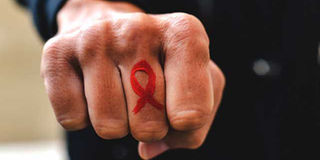Being HIV positive is my secret, not yours

What you need to know:
This week, the author had intended to talk about a different subject but he changed his mind after encountering an HIV case that seemed more intriguing and educative for his readers.
I met a patient - a widow from Singida who was referred to Benjamin Mkapa hospital in Dodoma region for a CT scan after she fell down abruptly.
The reason being was that the doctors at the peripheral hospital wanted to rule out whether she had any internal bleeding [in her brain].
Being kept at liberty, the her relatives asked that she be tested for other issues like HIV, though they spoke of it indirectly but I was able to take in what they actually meant.
What I observed and it was quite sad to see that the relatives were more interested to know about the patient’s HIV status than the patient herself, but she couldn’t argue back in the open.
This sounded astounding to me but I tried hard to thwart myself from saying anything that would tread on their toes whilst constantly sticking to my guns as a medical doctor.
Then, when results came out, I sat down with the patient, briefing her on the investigation results.
On the spur of the moment, she allowed me to disclose them to her relatives except for the HIV test results but then relatives questioned furiously, “tulikuambia umpime kila kitu kwanini, hujampima?” [we asked you to test her for everything, why didn’t you?]
One of the relative even went on to the extent of saying, “I am her blood sister, I am one among the relatives who settles her bill at the hospital. I must know her HIV results, so that she can start taking medication at the earliest.”
It can be a challenge sometimes as a medical doctor to be in such a tug of war.
I had to tell them in detail what they ought to understand with regards to the matter. It is no wonder that I had to even allude to some of the formalities as well.
Professional and humane rationales whilst constantly being non-committal about the patient’s HIV results as per her humble request.
To whom did she disclose?
In confidentiality, I asked the patient whether she knew beforehand that she was HIV positive.
In a quick rejoinder, she revealed her issues to me, “Yes, I know and I have already started taking antiretroviral (ARV) drug but I do not want them to know about that, I have decided to inform only my young sister since I know she is the only person who can keep my secret.”
Mind you, disclosure of HIV status is an important approach in VCT (Voluntary Counselling and Testing) services especially in preventing infections.
Of course there is a satisfying trend that in Tanzania the rate of HIV status disclosure to the partners is increasing, however, many do not disclose to the general public.
Studies done in Tanzania have indicated that age, level of education, and financial independence particularly for women were found to be important factors in predicting HIV status disclosure.
In a study done by Kiula and others in Morogoro, Tanzania, it was found that HIV positive women with higher level of education, younger and financially independent were likely to disclose their status. But what about men? Do they disclose their status to their respective partners?
Perhaps I have to look for the data and do my research before I answer this.
Was the doctor abiding by the Tanzanian laws?
It was really an arduous task to work with her relatives. Of course the relatives insisted that they were going to make sure that she goes and tests somewhere else in Singida, regardless of my professional advice.
I recall one of the relatives of the widow saying, “tunaenda kumpima, watoto wake lazima wajue, huyu lazima anao, sasa kama hana kwanini hataki kupima?” [we are going to make sure that she gets tested at a nearby home centre. Her children must know the results, she must be HIV positive, if not, why is she refusing to be tested?]
In Tanzania, HIV Testing is being fulfilled through VCT, PITC (Provider Initiated Testing and Counselling) and CBT (Community Based HIV Testing campaign). Therefore within these modalities, the HIV status disclosure is practically emphasised.
When you peruse Tanzania’s constitution document, you will be enchanted to find that there is a clause that grants Tanzanians a general right to the privacy of his/her own personal life, family and of matrimonial life that includes respect and protection of his/her residence and private communication, to protect the right to privacy.
It further highlights that “the state authority shall lay down legal procedures regarding the circumstances, manner and the extent to which the right to privacy may be encroached upon without prejudice to the provisions of this article.”
Additionally, The Tanzania National guidelines for management of HIV/ AIDS states that a health facility providing HIV services must have, a confidential consultation room, a locked area for medical records with limited access and a proper patient records and reporting system.
World Health Organisation recommends a clear legal framework for collection, storage, disclosure, and use if the health information to protect individual patient data.
After reading this article you can at least be able to fathom out that doctors do their part wherever possible to discourage stigma and unlawful HIV/AIDS status disclosure.
The author is a medical doctor, public health activist, a scientist and researcher.


